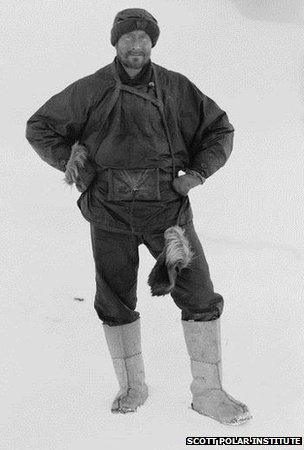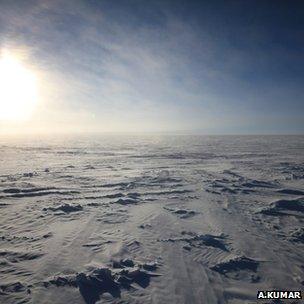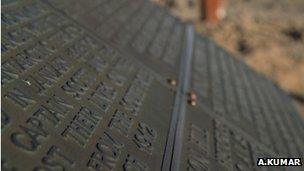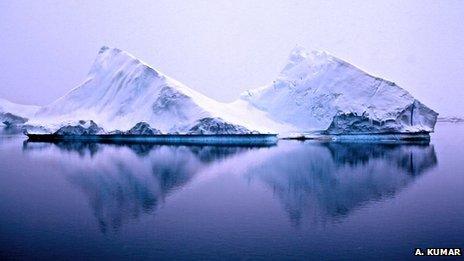Wilson of the Antarctic: Forgotten hero
- Published
A century ago, Captain Robert Falcon Scott's expedition to the South Pole ended in tragedy.
While Scott's names lives on in history, the story of other members of the team have been lost in time. Antarctic-based doctor Alexander Kumar, originally from Derbyshire, explains why one of Scott's team, Edward Wilson, is a forgotten hero.
A century ago, in the frozen wilderness of Antarctica, the extraordinary life of naturalist, artist and medical doctor Edward Wilson ended.
Wilson's commitment to alleviating human suffering, undertaking scientific research, creative excellence and exploration has always inspired me.

Edward Wilson was the first medical doctor to reach the South Pole
Today, I live in Antarctica as the medical doctor at Concordia, an isolated inland research station - more remote than the South Pole.
I'm also undertaking European Space Agency (Esa) research to assist with planning human missions to Mars. Captivated by the wonder of the beyond, like Wilson, I dream of new discoveries.
In 1901, having overcome Tuberculosis but feeling disillusioned as a newly-qualified doctor, Wilson had been blessed by finding an opening on Captain Scott's Discovery Expedition only three weeks before its departure to Antarctica.
Wilson set sail to the frozen white continent, aged just 29.
Last year, at 28, I found an Esa job advertisement offering a life in Antarctica it described as more isolated than the International Space Station.
Sharing similar disillusionment as Wilson had with life, and having lived, worked and travelled through more than 60 countries, this appealed to me the way a fabled newspaper advertisement used for recruitment by Sir Ernest Shackleton had to him.
"Bitter cold, long months of complete darkness, constant danger, safe return doubtful," it had offered.
I got the job and, sharing Wilson's passion for the natural sciences, followed in his footsteps to the end of the world.
On a previous research trip, I had travelled from the UK to the heart of the Amazon rainforest in just four days.
This time it took two weeks of continuous travelling across more than 17,500km (10,900 miles) to arrive at Concordia Station.
It is located in the Antarctic Plateau - the world's largest, driest, coldest and most isolated desert.
Concordia research station is a joint initiative run by the French Polar Institute and Italian Antarctic Programme.
Extreme environment
Outside the station, no flora or fauna can survive and there is nothing for more than 1,000km (621 miles) in most directions.

Isolation and extreme conditions make the Antarctic Plateau one of the planet's harshest places
It suffers extreme unpredictable weather, the outside temperatures dropping to below -80C (-112F), the coldest on Earth.
The polar atmospheric pressure on the Dome Charlie plateau creates an equivalent altitude of 3,800m (about 12,500ft), presenting additional challenges. Every day we battle chronic hypobaric hypoxia (lack of oxygen) - breathing one-third less of oxygen than at sea level.
We are completely unreachable from February until mid-November, with no opportunity for evacuation even in the case of a medical emergency. We are as far away and alone as Scott's expeditions were 100 years ago.
This is the closest you can come to living on another planet. For this reason, the polar regions are used for human spaceflight research, offering the same degree of isolation and challenges faced by space travel.
By braving such extreme conditions, Wilson led a team out into the Antarctic winter's night. It became a gruelling tale of survival, later termed the "worst journey in the world".
Inspired by such polar tales of the past, I will endure the psychological challenge of living through the worst winter the world has to offer, with four months of 24-hour darkness between May and August.
The devastating news that our Italian doctor had to return home left me as the only medical doctor left at the station. I was presented with the difficult decision to either to take sole responsibility or suffer the unthinkable: cancelling our winter, abandoning our research and returning home empty-handed.
I remembered Wilson's own words when he suffered similar setbacks: "Everything seems to have gone wrong with the expedition's prospects so far.

Concordia Station is a joint Italian and French-run outpost
"We start handicapped but all will become right and as God wills."
With additional support from the British Antarctic Survey Medical Unit, I took on the role and have never looked back.
It is the first time since Concordia Station was built that only one doctor has been present during winter.
Making history
On 17 January 1912, Scott's team reached their objective and Wilson became the first doctor to reach the South Pole.
But the British team had been beaten to their goal, arriving shortly after Roald Amundsen. Feeling defeated and disheartened, Scott wrote: "Great God, this is an awful place."
Living isolated in Antarctica can be compared to living in a war zone and forges the same unbreakable bonds of human companionship, fighting together for survival.

A memorial to Captain Scott and the team is a permanent reminder of the dangers facing scientists
Wilson was among the three last surviving members who battled on, having reached the pole. But the team soon became ice-locked in their tent by extraordinarily bad weather, before finally succumbing to starvation.
On 29 March, 1912, Scott made his last diary entry.
He wrote: "Words must always fail me when I talk of Bill Wilson. I believe he really is the finest character I ever met."
Wilson's body was found beside his.
Although Scott's team was not the first to the South Pole, they left a blazing legacy of Antarctic science, inspiring others like myself.
A century ago, Wilson attained his dream of standing at the true geographical South Pole. Man would not step foot on the Moon for another 50 years.
Today, 100 years later, I sit at a large comfortable desk in my own modern laboratory located at Concordia, with my own dream of a manned mission to Mars.
There is something magical about Antarctica - it is a place of both dreams and nightmares.

Alex Kumar will stay at the station during the Antarctic winter
An alluring and unexplored continent, it is a refuge and sanctuary for scientists and wildlife alike.
It has provided many answers to science, but importantly now provides global warnings: ice cores demonstrating how human history is causing a changing climate, melting ice caps and the discovery of a damaged ozone layer.
Loosely protected by the Antarctic treaty, the continent should not be seen as an answer to our ever-growing population and energy needs. If the world climbs aboard Antarctica, it will sink.
It is crucial the Arctic and Antarctic remain free from exploitation and natural resource exploration.
I hope that some doctor, 100 years from now, can stand where Dr Wilson and I have stood and feel inspired by the cold, discover its treasure and appreciate the great white silence.
Dr Alexander Kumar FRGS is the Concordia Station doctor (Institut Polaire Français) and European Space Agency-sponsored research MD

- Published29 March 2012
- Published17 January 2012
- Published10 March 2012